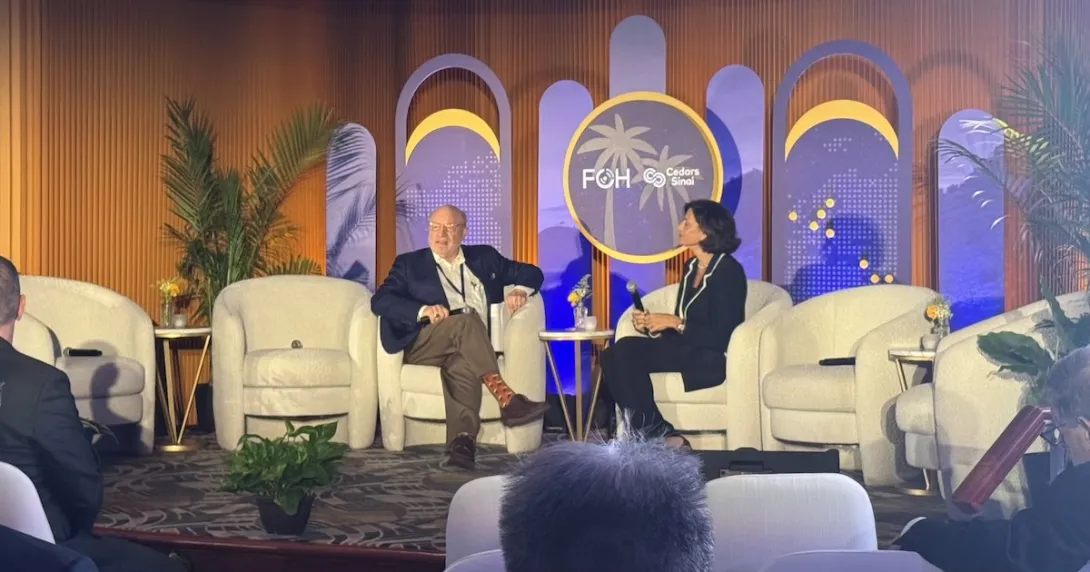
Rochelle Walensky, former director of the CDC, and Chip Kahn, Future of Health co-chairman and president and CEO of the Federation of American Hospitals
Photo: Jessica Hagen/MobiHealthNews
LOS ANGELES – During Future of Health's invitation-only event last week, Rochelle Walensky, former director of the Center for Disease Control and Prevention (CDC), and Chip Kahn, Future of Health co-chairman and president and CEO of the Federation of American Hospitals, discussed how current medical education requirements and policies stifle the healthcare workforce and the current state of vaccine guidance in the U.S.
"It is interesting to see, not just the GME [General Medical Eduction] policies, but how some of the policies that are being enacted right now are cutting us off at the knees, if you will," Walensky said.
She said the Dobbs decision, which was the Supreme Court 2022 ruling that overturned Roe v. Wade and made abortion illegal, is influencing whether medical residents aged 20 to 30 relocate to certain regions because of a lack of abortion care for themselves.
H1-B policies, which as of September 2025 mandate companies to pay a one-time fee of $100,000 to file certain new H-1B petitions for workers, are also causing negative implications for healthcare, she said.
"There was just a paper I was looking at this morning in JAMA that said about 1% of our medical workforce is on an H-1B, and twice the number of H-1Bs are in rural areas," Walensky said.
"So, in all the places where we have real medical care deficits, like in rural areas, many of these policies, in addition to GME policies, are actually working to deter getting workforce to those spaces."
Walensky said there are many places along the pipeline where things can be improved, including medical training.
"One could argue, do we really need all the training that we have? Do we need four years of college, four years of medical school, and six/seven years of post-medical training as residencies and fellows to do this super specialized thing, like an X specialty might do," Walensky said.
She said there are increasingly medical schools in the U.S. that have three year programs, but there is a pipeline problem as there are not enough slots in medical schools for the amount of applicants.
"In 2014, the IOM [Institute of Medicine] said we need more GME slots, and nothing has been done since then to extend the number of GME slots," Walensky said. "States are putting some of the money toward that because the federal government or CMS has not, but it is not filling the gap."
The stalled federal response on GME expansion reflects broader inconsistencies in U.S. health leadership, with tension also being seen in vaccine policy and public trust.
Kahn said that in the U.S., in particular, there is a Health and Human Services Department leader, referring to Robert F. Kennedy, Jr, who is skeptical about vaccines generally.
"[Kennedy's] concerns are sort of rippling down into federal policy, which at best is leading us as a nation, and this may have an effect in other areas of the world, into ambiguity about vaccines," Kahn said.
Walensky said that since early Spring she has been working with the Vaccine Integrity Project, which is out of the University of Minnesota, the Center for Infectious Disease Research and Policy (CIDRAP).
Once Kennedy dismissed the Advisory Committee on Immunization Practices, the philanthropically-funded group decided that something needed to be done, Walensky said.
"Usually the CDC is the place where all the data are pulled together. The Advisory Committee, the working group of the ACIP, pulls data together and then presents it at the advisory committee meeting. That didn't happen," Walensky said.
"As we were going into respiratory virus season in the summer, we said, 'You know what? Somebody has got to pull together the published data on what we should do about influenza, RSV and COVID.''"
The group put together a PROSPERO protocol for the review and 17,000 papers came up through July 31. The group double extracted all the data from 511 of those papers to look at vaccine safety and effectiveness and published a synthesis of the data in the New England Journal of Medicine.
The papers can be accessed through the Vaccine Integrity Project website.
Ultimately, Walensky said, the group is well aware that it cannot be what the CDC used to be and cannot serve as the federal government.
"We are a group that is trying to pull the data together in a very transparent way so that the American public, the societies have access to them, decision makers have access to them, and our state and local health departments have full access to them when they otherwise don't get them," Walensky said.
Khan said the HHS has also cut off some funding for vaccine innovation, and Walensky expressed her concern for this, as well as what she says are the many ways in which the government has tried to undermine research funding and vaccine availability.
"One is the Vaccines for Children Program. This is a program that pays for vaccines for our under and uninsured children, and it funds about half of the vaccines for children in [the U.S.]," Walensky said.
"When they say that they're messing with the 'vaccine schedule,' that's what they're messing with. If it's not on the vaccine schedule, it won't be on the Vaccines for Children Program. If it's not on the Vaccines for Children Program, our children won't have access to it."
Another program is the Vaccine Injury Compensation Program, which sits in the Health Resources and Services Administration and is the program that compensates Americans for true vaccine injury. The program holds generally harmless the person who gives the vaccine as well as the manufacturer of that vaccine.
Walensky says there are cases where harm has come for the vaccine recipient, but emphasizes that these are extremely rare cases.
"In the absence of the Vaccine Injury Compensation Program, we will not have companies that want to make a vaccine," Walensky said.
She says vaccines are not the money makers for these companies, and the reason the Vaccine Injury Compensation Program exists is because companies and manufacturers, historically, would pull out when they thought that they were going to be held liable for potential vaccine injury.
"Among the things that has been on the table is to put autism on the list of things for the Vaccine Injury Compensation Program to pay out. If they do that, it'll go broke and it will not be a viable program anymore," Walensky said.
She said the federal government is not just undermining public trust in vaccines, but also trying to dismantle the infrastructure that ensures vaccines are effective in the U.S.
"There are a lot of people who are interested in making sure that we are served well after this administration in the space of vaccines, and a lot of convening and discussions are happening across the country to make that possible," Walensky said.
The HIMSS AI & Cybersecurity Virtual Forum is free to attend on Nov. 18. Learn more and register.


